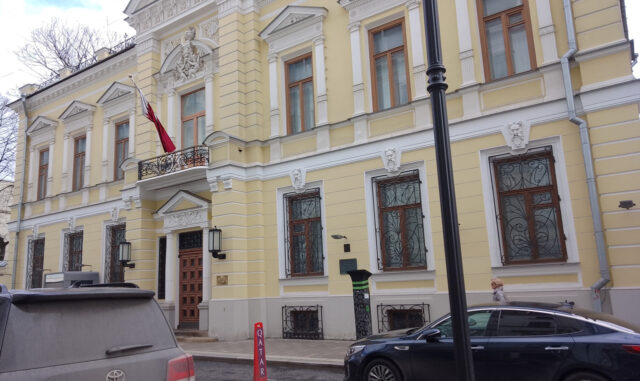Qatar Prime Minister’s Visit to Russia to Discuss the Situation in Palestine: Why Matters?

Geopolitical Report ISSN 2785-2598 Volume 36 Issue 2
Author: Giuliano Bifolchi
The upcoming visit to Russia of Qatar Prime Minister accentuates Doha’s role among the Arab and Muslim countries to promote the end of the conflict in the Gaza Strip and Moscow’s desire to become more involved in the Middle Eastern dynamics.
Since the Russian Federation has a significant presence of Muslim people in the country and the Kremlin has adopted a foreign policy aimed at strengthening relations and economic cooperation with the Arab-Muslim world, the cooperation with Qatar and other Gulf monarchies might represent an opportunity for Moscow’s strategy in the region.
Qatar-Russia Cooperation on Palestine:
Information Background
On November 21st, 2023, Prime Minister and Foreign Minister of Qatar Mohammed bin Abderrahman Al Thani will begin a visit to Russia and the United Kingdom as part of the mission of the foreign ministers of seven Arab and Muslim countries to end the conflict in the Gaza Strip. The official representative of the Qatari Foreign Ministry, Majid al-Ansari, reported this information.
According to al-Ansari, the visits will also focus “on launching a serious and real political process to achieve a lasting and comprehensive peace under approved international norms, as well as taking measures to contain the occupying powers and stop their crimes against humanity to ensure while providing corridors for the delivery of urgent aid to the Gaza Strip”.
At a summit in Riyadh a week ago, the leaders of Arab and Muslim countries agreed to create a committee to take international steps to end the conflict in the Gaza Strip, which included the foreign ministers of seven Arab and Muslim countries (Saudi Arabia, Turkey, Nigeria and Palestine) as well as Secretaries General of the League of Arab States and the Organisation of Islamic Cooperation.
Geopolitical Scenario
After Hamas’ military attack on October 7th, 2023, the Israeli-Palestinian conflict has again affected the world of international relations and influenced foreign affairs of Arab-Muslim countries, especially after the beginning of the Israeli military offensive in the Gaza Strip that, coupled with air raids, caused thousands of casualties among the civilian population.
Consequently, the world has experienced a division between those supporting the Palestinian people and those who advocate Tel Aviv’s rights of self-defence through a military operation aimed at destroying Hamas and the Palestinian Islamic Jihad.
Among the Gulf monarchies and the Arab and Muslim countries, Qatar has developed a special relationship with Hamas by subsidising the Islamic Resistance Movement and hosting its leadership in Doha. Although Qatar has helped to mediate with Hamas to release the hostages, Doha’s role in the peace process and the international arena has faced criticism because of the Qatari political and financial support of the Islamic Resistance Movement.
Russia, a nation with around 15-20 million of Muslims, attempted to navigate this international crisis by avoiding internal problems as happened at the Makhachkala airport on October 29th, 2023, when residents stormed the airport and tried to reach an airplane coming from Israel.
As Russian President Vladimir Putin and other government representatives have often declared, the Russian Federation is a multicultural and multi-confessional country where Christian, Muslim, Jewish, and Buddhist believers can live together thanks to the national Constitution.
By contrast, the Russian Federation is not immune neither from terrorism and the jihadist propaganda nor from xenophobia, Islamophobia, and internal crisis caused by the difficult cohabitation between people from different religious and ethnic groups.
Therefore, avoiding that the situation in Palestine will affect the Russian everyday life and divide the citizens is among the Kremlin’s main goals as well as tyring to strengthen Moscow’s position in the international arena, especially the Arab-Muslim world, by cooperating or siding with Gulf monarchies.
Undeniably, since the beginning of the Ukraine conflict in February 2022, the Russian Federation has intensified its strategy to enlarge cooperation and partnership with Arab and Muslim countries, as showed by the Kazan Forum 2023.
In 2023, the Kremlin also launched the pilot project of establishing the Islamic banking in Russia by testing Islamic financial products and services in Chechnya, Dagestan, Tatarstan, and Bashkortostan. These products can become significant in attracting foreign investors from the Arab-Muslim world, especially from the Gulf monarchies.
Conclusion
Although both Moscow and Doha have declared their commitment and desire to resolve the situation in Palestine by diplomatic efforts whose first goal should be the end of the conflicts in the Gaza Strip, Qatar Prime Minister’s visit to Russia might have different outcomes not related to the Israeli-Palestinian situation.
Qatar wants to show the world its emerging role in the Middle East as a valuable mediator and accredited Doha as a city for diplomatic dialogue, as happened in the past between the United States and the Taliban. Furthermore, since the Qatari support to Hamas, Doha might also use this opportunity to distance itself from the Islamic Resistance Movement or to show its influence on this organisation.
Russia, from its points of view, might use the situation in the Gaza Strip to be more engaged with Arab and Muslim countries and promote its agenda in the Islamic world which the Kremlin discussed during the Kazan Forum 2023.
In this context, the Israeli-Palestinian conflict might serve as an opportunity for both Doha and Moscow, which, behind the lines, might also discuss more cooperation in the energy, financial, and infrastructural sectors and promote their political agenda.
Do you like SpecialEurasia reports and analyses? Has our groundbreaking research empowered you or your team? Now is your chance to be a part of our mission! Join us in advancing independent reporting and unlocking the secrets of Eurasia’s complex geopolitical landscape. Whether through a one-time contribution or a monthly/yearly donation, your support will fuel our relentless pursuit of knowledge and understanding. Together, let’s pave the way for a brighter future. DONATE NOW and secure your place in shaping the geopolitical narrative.
